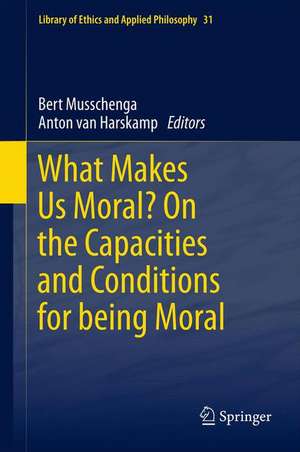What Makes Us Moral? On the capacities and conditions for being moral: Library of Ethics and Applied Philosophy, cartea 31
Editat de Bert Musschenga, Anton van Harskampen Limba Engleză Hardback – iul 2013
| Toate formatele și edițiile | Preț | Express |
|---|---|---|
| Paperback (1) | 566.19 lei 38-44 zile | |
| SPRINGER NETHERLANDS – 8 feb 2015 | 566.19 lei 38-44 zile | |
| Hardback (1) | 651.67 lei 6-8 săpt. | |
| SPRINGER NETHERLANDS – iul 2013 | 651.67 lei 6-8 săpt. |
Din seria Library of Ethics and Applied Philosophy
-
 Preț: 429.22 lei
Preț: 429.22 lei -
 Preț: 389.70 lei
Preț: 389.70 lei -
 Preț: 184.53 lei
Preț: 184.53 lei - 15%
 Preț: 647.40 lei
Preț: 647.40 lei - 15%
 Preț: 641.71 lei
Preț: 641.71 lei - 18%
 Preț: 951.47 lei
Preț: 951.47 lei - 18%
 Preț: 952.89 lei
Preț: 952.89 lei - 15%
 Preț: 645.79 lei
Preț: 645.79 lei - 15%
 Preț: 637.13 lei
Preț: 637.13 lei - 15%
 Preț: 644.95 lei
Preț: 644.95 lei - 15%
 Preț: 645.47 lei
Preț: 645.47 lei - 18%
 Preț: 895.76 lei
Preț: 895.76 lei - 18%
 Preț: 959.67 lei
Preț: 959.67 lei - 15%
 Preț: 642.68 lei
Preț: 642.68 lei - 15%
 Preț: 642.51 lei
Preț: 642.51 lei - 15%
 Preț: 640.71 lei
Preț: 640.71 lei - 15%
 Preț: 642.68 lei
Preț: 642.68 lei - 15%
 Preț: 635.01 lei
Preț: 635.01 lei - 15%
 Preț: 638.43 lei
Preț: 638.43 lei - 24%
 Preț: 783.24 lei
Preț: 783.24 lei - 15%
 Preț: 634.18 lei
Preț: 634.18 lei - 15%
 Preț: 636.63 lei
Preț: 636.63 lei - 15%
 Preț: 638.57 lei
Preț: 638.57 lei - 15%
 Preț: 635.47 lei
Preț: 635.47 lei - 20%
 Preț: 565.64 lei
Preț: 565.64 lei - 15%
 Preț: 644.82 lei
Preț: 644.82 lei
Preț: 651.67 lei
Preț vechi: 766.67 lei
-15% Nou
Puncte Express: 978
Preț estimativ în valută:
124.71€ • 128.84$ • 103.79£
124.71€ • 128.84$ • 103.79£
Carte tipărită la comandă
Livrare economică 25 martie-08 aprilie
Preluare comenzi: 021 569.72.76
Specificații
ISBN-13: 9789400763425
ISBN-10: 9400763425
Pagini: 336
Ilustrații: VIII, 352 p.
Dimensiuni: 155 x 235 x 27 mm
Greutate: 0.73 kg
Ediția:2014
Editura: SPRINGER NETHERLANDS
Colecția Springer
Seria Library of Ethics and Applied Philosophy
Locul publicării:Dordrecht, Netherlands
ISBN-10: 9400763425
Pagini: 336
Ilustrații: VIII, 352 p.
Dimensiuni: 155 x 235 x 27 mm
Greutate: 0.73 kg
Ediția:2014
Editura: SPRINGER NETHERLANDS
Colecția Springer
Seria Library of Ethics and Applied Philosophy
Locul publicării:Dordrecht, Netherlands
Public țintă
ResearchCuprins
Preface
Bert Musschenga: What makes us moral? An introduction
Part I: Morality, evolution and rationality
Alejandro Rosas: Rationality and deceit; Why rational egoism cannot make us moral
Katharine Browne: Two problems of cooperation
Catherine Herfeld and Katrien Schaubroeck: The importance of commitment; How Harry Frankfurt’s concept of care contributes to Rational Choice Theory
Markus Christen and Thomas Ott: Quantified coherence of moral beliefs as predictive factor for moral agency
Part II: Morality and the continuity between human and nonhuman primates
Bert Musschenga: Animal morality and human morality
Florian Cova: Two kinds of moral competence; Moral agent, moral judge
Andrés Luco: Humean moral motivation
Harry Wels: Whispering empathy; Transdisciplinary reflections on research methodology
Part III: Nativism and non-nativism
Jessy Giroux: The origin of moral norms and the role of innate dispositions
Carsten Fogh Nielsen: It’s complicated – Moral nativism, moral input, and moral development
Julia Hermann: Learning to be moral
Gerben Meynen: Why mental disorders can diminish responsibility; Proposing a theoretical framework
Darcia Narvaez: Natural morality, moral natures and human flourishing
Part IV: Religion and (im)morality
Stephen Maitzen: Atheism and the basis of morality
Anton van Harskamp: What makes the martyr (im)moral?
Bettine Siertsema: Moral lessons from monstrosity; The Kindly Ones and the reader
Part V: Morality beyond naturalism
David Rose: Society and the origin of moral law: Giambattista Vico and non-reductive naturalism
Adam Seligman: Enacting the moral: concrete particularity and subjunctivespace
About the authors
Index of names and subjects
Bert Musschenga: What makes us moral? An introduction
Part I: Morality, evolution and rationality
Alejandro Rosas: Rationality and deceit; Why rational egoism cannot make us moral
Katharine Browne: Two problems of cooperation
Catherine Herfeld and Katrien Schaubroeck: The importance of commitment; How Harry Frankfurt’s concept of care contributes to Rational Choice Theory
Markus Christen and Thomas Ott: Quantified coherence of moral beliefs as predictive factor for moral agency
Part II: Morality and the continuity between human and nonhuman primates
Bert Musschenga: Animal morality and human morality
Florian Cova: Two kinds of moral competence; Moral agent, moral judge
Andrés Luco: Humean moral motivation
Harry Wels: Whispering empathy; Transdisciplinary reflections on research methodology
Part III: Nativism and non-nativism
Jessy Giroux: The origin of moral norms and the role of innate dispositions
Carsten Fogh Nielsen: It’s complicated – Moral nativism, moral input, and moral development
Julia Hermann: Learning to be moral
Gerben Meynen: Why mental disorders can diminish responsibility; Proposing a theoretical framework
Darcia Narvaez: Natural morality, moral natures and human flourishing
Part IV: Religion and (im)morality
Stephen Maitzen: Atheism and the basis of morality
Anton van Harskamp: What makes the martyr (im)moral?
Bettine Siertsema: Moral lessons from monstrosity; The Kindly Ones and the reader
Part V: Morality beyond naturalism
David Rose: Society and the origin of moral law: Giambattista Vico and non-reductive naturalism
Adam Seligman: Enacting the moral: concrete particularity and subjunctivespace
About the authors
Index of names and subjects
Textul de pe ultima copertă
This book addresses the question of what it means to be moral and which capacities one needs to be moral. It questions whether empathy is a cognitive or an affective capacity, or perhaps both. As most moral beings behave immorally from time to time, the authors ask which factors cause or motivate people to translate their moral beliefs into action? Specially addressed is the question of what is the role of internal factors such as willpower, commitment, character, and what is the role of external, situational and structural factors? The questions are considered from various (disciplinary) perspectives.
Caracteristici
Deals with the role of social and historical factors of morality Discusses whether animals can be said to have a morality Contains revealing case-studies, e.g., on the Holocaust, on terrorism, and on Vico Includes supplementary material: sn.pub/extras















